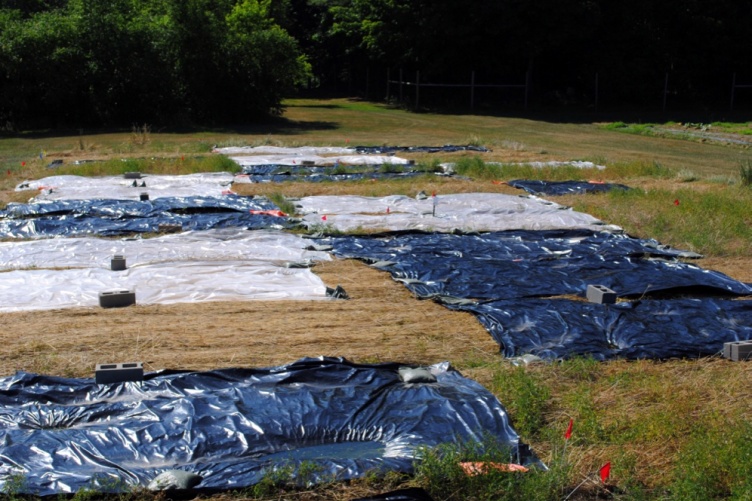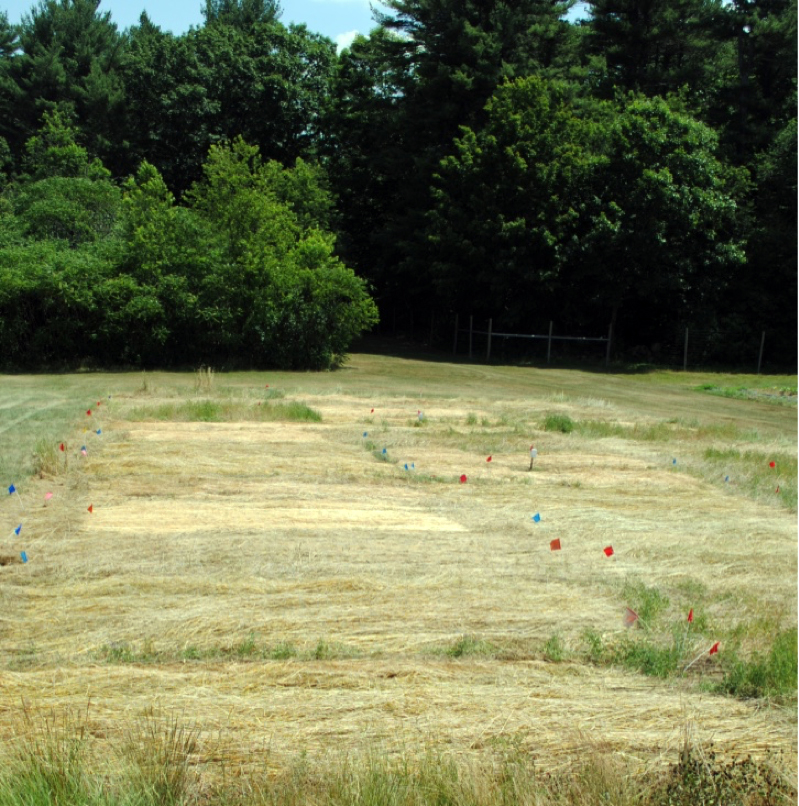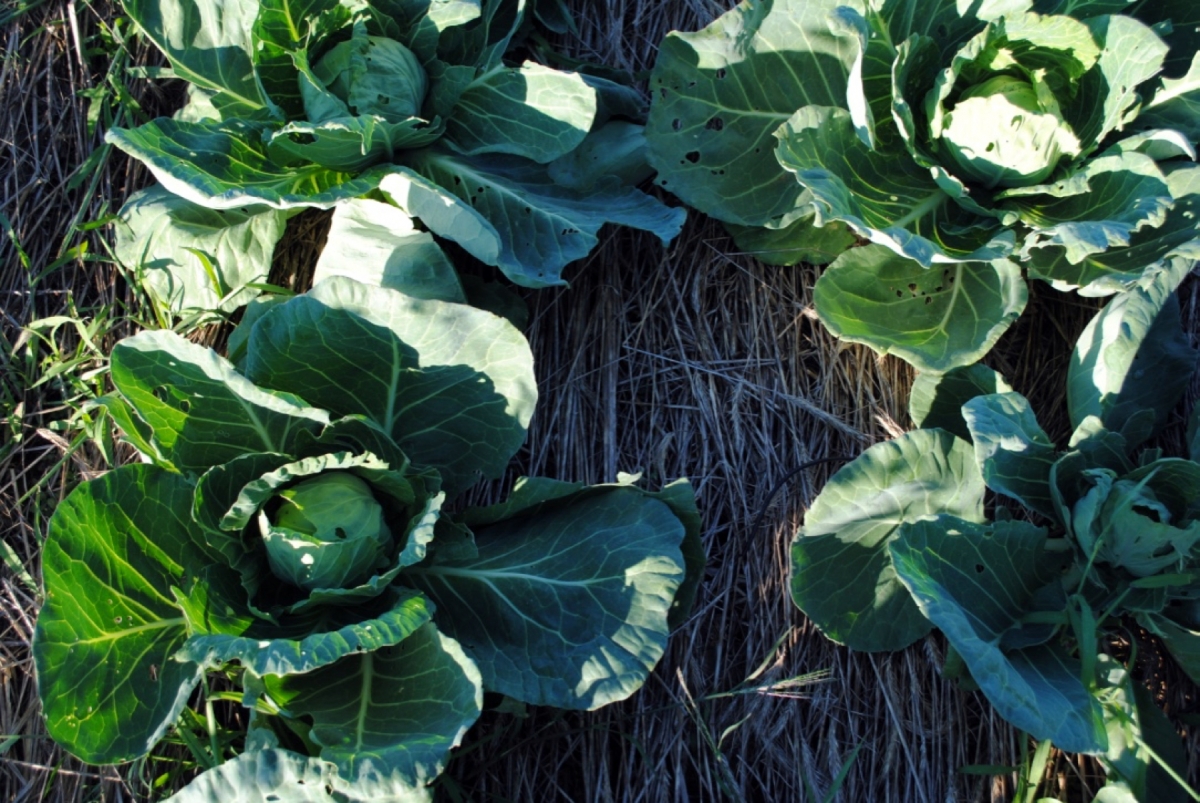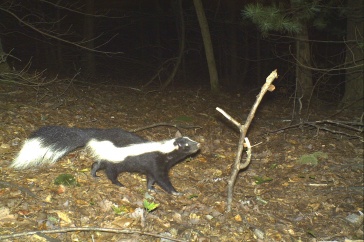
University of New Hampshire researchers have found that using black tarps and cover crops successfully suppressed weeds in an organic vegetable system, allowing scientists to forgo tilling, which can have deleterious effects on soil.
The research was conducted at the Woodman Horticultural Research Farm, a facility of the NH Agricultural Experiment Station, by Seamus Wolfe, a sustainable agriculture and food systems major, Dr. Richard Smith, associate professor of agroecology, Natalie Lounsbury, a doctoral student in agroecology, and Nick Warren, manager of the agroecology lab.

where black tarps, white tarps, and no tarps had been
located.
“It appears that it is possible to provide enduring weed suppression in a cover crop-based organic no-till vegetable system by using black tarps to help terminate cover crops and limit weeds,” Lounsbury said. “Many people relish the bucolic image of a plowed field or a tilled garden, but tilling the soil has deleterious effects on soil structure and biology. A tilled, bare soil is vulnerable; in a dry summer like 2016, it dries out quickly from evaporation, leaving plants struggling to get enough water, and in a wet year, it is susceptible to erosion losses.”
“Nonetheless, extensive tillage is the standard practice for vegetable production, largely because of the need to control weeds. This project attempted an integrated approach to soil and weed management in organic vegetable production that may help small farmers and gardeners alike balance the need for weed control with the desire to improve soil health and conserve soil moisture,” she said.
The researchers planted a cover crop (a mixture of winter rye and hairy vetch) in the fall. In the spring, they flattened the cover crop using a tractor-mounted tool called a roller-crimper. After suppressing the cover crops with the roller-crimper they covered the resulting mulch with either black tarps, clear tarps or no tarps. Then the researchers removed the tarps and planted cabbage directly into the cover crop mulch to determine if cabbage yields and future weed suppression varied depending on treatment.
Although the cabbage has not been harvested yet to assess yield, scientists said they can see dramatic treatment effects regarding weed suppression. To draw broader conclusions, more research under a variety of soil and climate conditions is needed, but the first results are both promising and interesting.
“The weed suppression where there was a black tarp is nearly 100 percent six weeks after transplanting, whereas there is substantial weed growth and/or vetch regrowth in the other treatments. Clear tarps rapidly killed the cover crops and weeds, but the weed suppression did not last. Where there was no tarp at all, there is substantial vetch regrowth,” Lounsbury said.
Organic no-till has been called the holy grail of farming because it has the potential to bring together two practices -- organic farming and no-till farming -- that each reduce the environmental impact of agriculture but have been largely incompatible. Organic farming relies on tillage to control weeds, while no-till farming primarily relies on herbicides.

had nearly no weeds six weeks after transplanting cabbage.
Eliminating tillage and herbicides is extremely difficult, but researchers and farmers throughout the country have been making tremendous advances in the last decade by using cover crops grown in place and then mechanically killed to provide a mulch to help manage weeds. Much of this research has been in organic grain cropping systems, but there is substantial evidence that these systems can work for vegetable production, too.
“In an increasingly variable climate, production systems that can handle wet and dry extremes will become even more important. The beauty of a system like a cover-crop based no-till system is that it is buffered against these extremes. The key concept in these systems is resilience,” Lounsbury said.
This material is based upon work supported by the NH Agricultural Experiment Station, through joint funding of the National Institute of Food and Agriculture, U.S. Department of Agriculture, under award number 229253, and the state of New Hampshire. This research project also received support from Green Start. For more information on this research project, visit http://notillveggies.org/.
Founded in 1887, the NH Agricultural Experiment Station at the UNH College of Life Sciences and Agriculture is UNH’s original research center and an elemental component of New Hampshire's land-grant university heritage and mission. We steward federal and state funding, including support from the USDA National Institute of Food and Agriculture, to provide unbiased and objective research concerning diverse aspects of sustainable agriculture and foods, aquaculture, forest management, and related wildlife, natural resources and rural community topics. We maintain the Woodman and Kingman agronomy and horticultural farms, the Macfarlane Greenhouses, the Fairchild Dairy Teaching and Research Center, and the Organic Dairy Research Farm. Additional properties also provide forage, forests and woodlands in direct support to research, teaching, and outreach.
-
Written By:
Lori Wright, '06G | NH Agricultural Experiment Station | lori.wright@unh.edu | 16038621452





















































